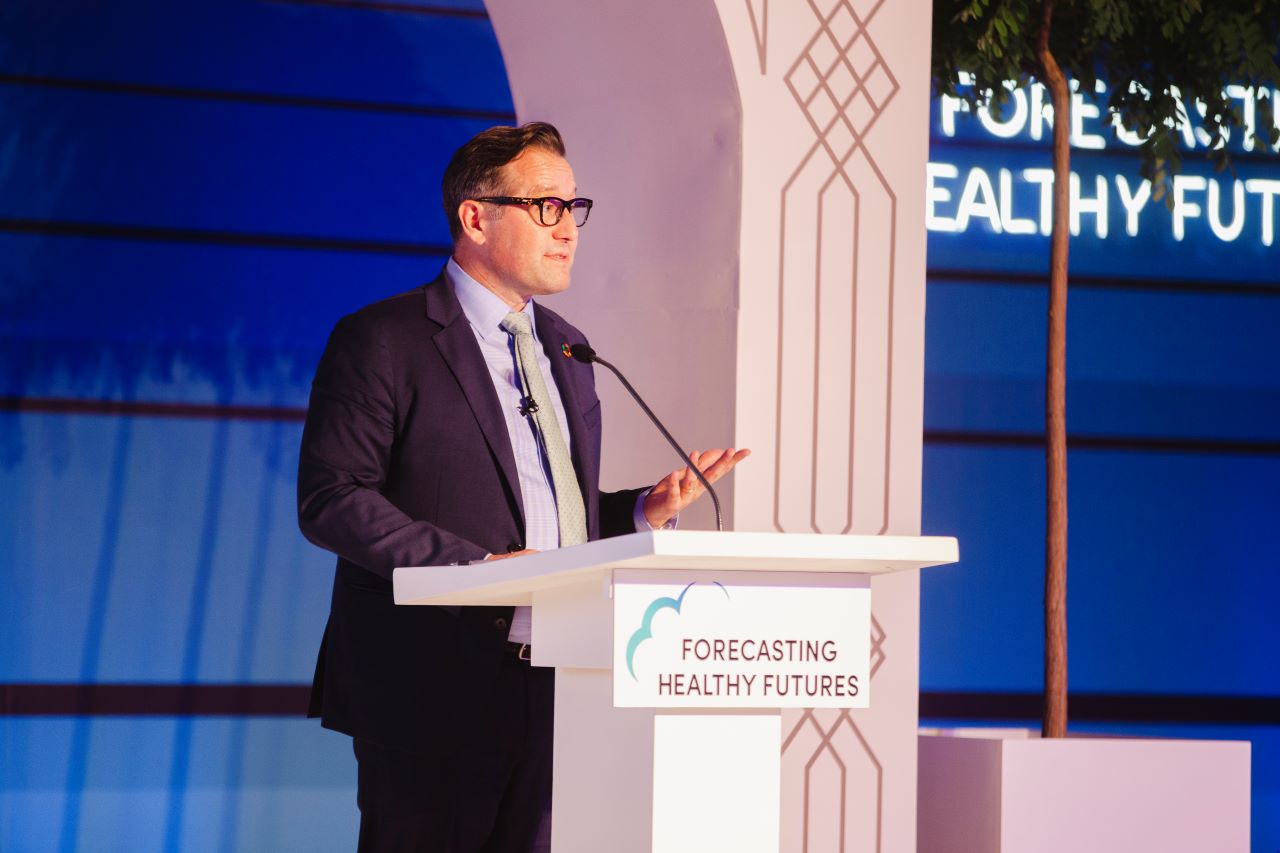Forecasting Healthy Futures is a global coalition of leading organizations committed to mobilizing the political will, financial resources, and innovative solutions needed to protect global health gains from the threats posed by climate change.
Last month, Forecasting Healthy Futures, a global consortium of organizations committed to protecting global health gains from the impact of climate change, hosted its second annual Global Summit in Baku, Azerbaijan. In the lead-up to the 2024 UN Climate Change Conference (COP29), which will be hosted by Azerbaijan in November, the Global Summit offered an opportunity to convene and facilitate discussions amongst local and global stakeholders from the climate and health communities.

Kelly Willis, Malaria No More, at the Global Summit in Baku, Azerbaijan. Photograph: Malaria No More
The Summit welcomed a diverse group of nearly 270 leaders representing 200 organizations and more than 45 countries, from government, private sector, NGOs, global finance institutions, higher education and COP29. Sessions throughout the three-day Summit covered a variety of topics including climate financing for health, climate change and mental health, loss and damages considerations for COP29, and approaches to building a climate-resilient workforce.
On the final day of the Summit, speakers discussed the impact of climate change on malaria, dengue and other “climate-sensitive” diseases. Here is what we heard:
Climate change is changing how vector-borne diseases spread
“As climate change threatens to undo decades of progress in malaria control and elimination, PMI works with 30 partner countries in sub-Saharan Africa and the Mekong Subregion in Southeast Asia to support stronger and more resilient health systems that combat malaria and protect against current and future health threats. One of the questions that I often hear when I visit PMI partner countries is, what are we going to do next when the next storm hits? That question is so critical as we continue to see an increase in the frequency and severity of climate shocks.”- David Walton, US Global Malaria Coordinator, U.S. President’s Malaria Initiative (PMI)
Watch the full panel discussion: Spotlight on Climate-Sensitive Disease
“Globally, we’re seeing anticipated expansion of the geographic footprint of both dengue as well as Aedes mosquitoes […]. In Southeast Asia, [we] have got major outbreaks happening again and again and perhaps more frequently. So, I think all signs point to it […] a worsening dengue problem, globally, not just confined to any one part of the world.” – Eng Eong Ooi, Professor & Associate Dean, Duke-NUS Medical School

Martin Edlund, Malaria No More, highlighting the devastating effects of climate change on malaria and dengue at the start of the Spotlight on Climate-Sensitive Disease panel discussion. Photograph: Malaria No More
“This month marks the second anniversary of the apocalyptic flooding in Pakistan that submerged one third of the landmass and impacted 33 million people back in 2022. And the aftermath of that flooding was a public health nightmare. We saw a five-fold increase in malaria cases […]. We saw about twice as big a jump in dengue fever in Pakistan. And frankly, the levels of mosquito-borne diseases have still not come down to the baseline from that pre-flooding era. Flood-contaminated water led to a cholera outbreak that afflicted 99,000 people in a single day in one of the hardest hit districts. And routine illnesses suddenly became life threatening as people were cut off from health care and stranded on inland islands. Looking back, I think Pakistan will be remembered as the moment that the world woke up to the climate driven health crisis.” – Martin Edlund, Chief Executive Officer, Malaria No More
“People are moving from rural areas into urban areas to have better economic opportunities, better lifestyles, better access to infrastructure. And the places they’re occupying are places where mosquitoes are proliferating, and that puts them at a really great risk for several different diseases.” – Bill Pann, Professor, Duke University
Climate action is imperative to protect health
“Understanding the impacts of climate change is critical for defining priorities for addressing strategies, which have implications on global health security.” – Prabir Kumar Sen, Former Add’l Director-General, India Ministry of Health and Family Welfare
“In the Americas, we have invested a lot in molecular resting […] the genomic surveillance has been something that we are pushing in a context of collaborative surveillance. I would say that the game changer in terms of surveillance has been the establishment of a regional laboratory network, starting with dengue.” – Sylvain Aldighieri, Director, Department of Communicable Diseases Prevention, Control & Elimination, Pan American Health Organization (PAHO)

Aravindan Srinivasan, AVPN, highlighting the importance of innovative solutions during the session on dengue and climate-sensitive diseases. Photograph: Malaria No More
“If we want to really make a dent […] we must get the funders into the room where experts, but also other stakeholders can come in and listen and say, is this going to be a priority for us or not? […] If we are able to show a pathway for social investors, that aligns with the health systems approach, which is longer term […] that’s more sustainable.” – Aravindan Srinivasan, Head, Climate Action Platform, AVPN
“Vector surveillance is a need of the hour because we really do not know what is in our backyard. And vectors are moving rapidly […]. As for the issue of partnerships, there is a need for periodic burden estimation […]. We need to estimate the true burden of disease […] so that we are able to tell decision-makers the true picture.” – Raman Velayudhan, Unit Head, Veterinary Public Health, World Health Organization (WHO)
The Global Summit was an excellent opportunity to underscore the urgency of immediate action in the face of an escalating climate crisis. The impacts of climate change have become increasingly apparent and are expected to worsen in the coming years. Vulnerable and less-equipped communities face heightened risks, as changing weather patterns introduce new challenges in preventing, controlling, and eliminating diseases like malaria and dengue. To mitigate the impact on those most at risk and build resilience for the future, we must leverage existing tools and embrace emerging innovations.
